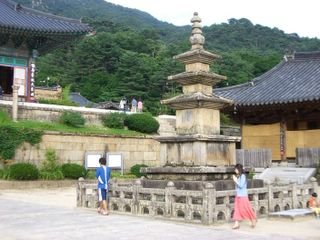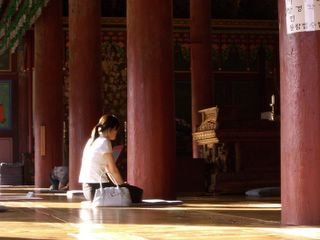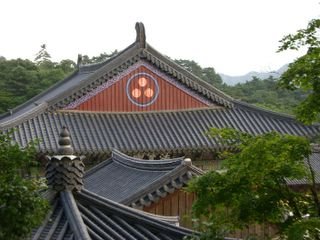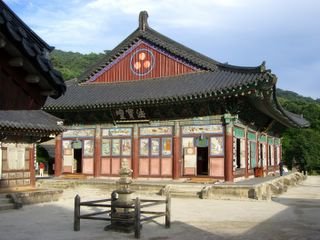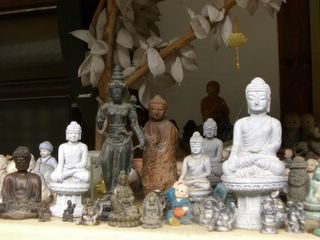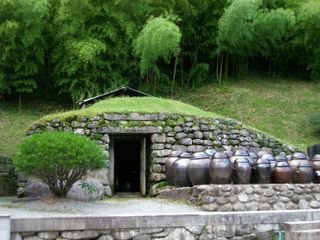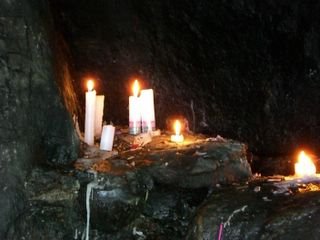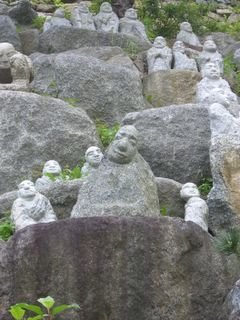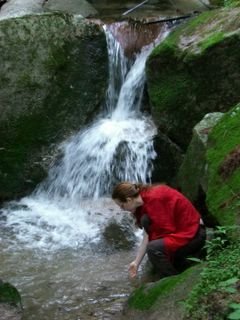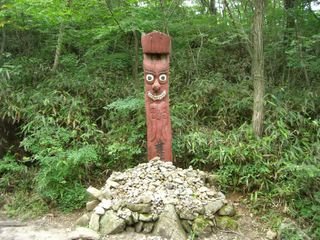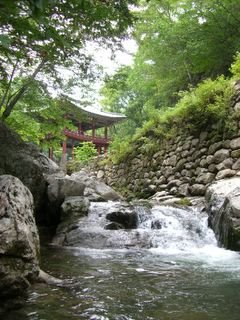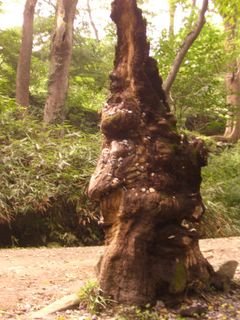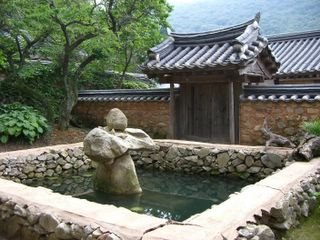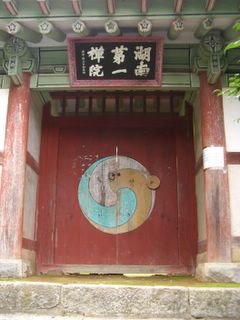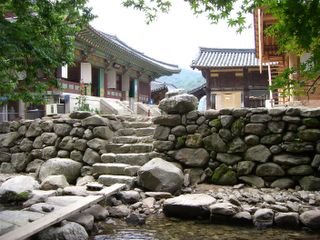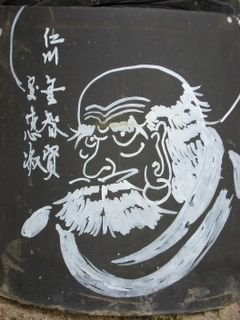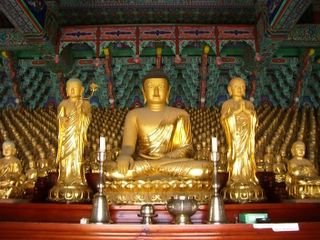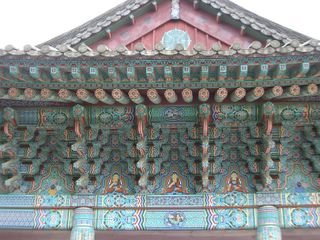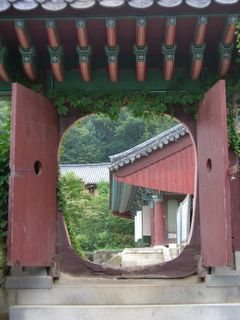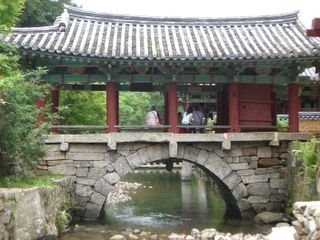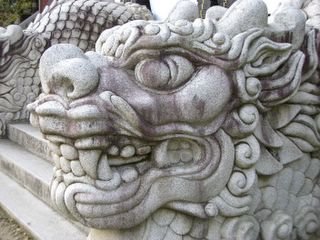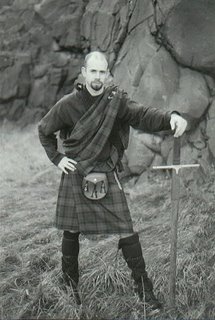I went on a road trip.
I decided I needed to try out my new wheels on a bit of a trip around this area and see some new sights. So I picked up my friend Nicola and two of her friends, Amy and JP, and we headed off to Daegu.
For those of you who don't know Korea, Daegu is the third largest city in Korea and is a huge commercial and industrial center... which of course means it's kinda large and dirty, but it does have a redeeming factor... two actually.
First, Nicola's sister lives there. A very nice girl, even if she does talk with a funny eccent. (She's from New Zealand after all.) And Second, there is a Costco in Daegu. Very over priced, but great for all that western stuff you just can't get elsewhere.
But the best and perhaps most unexpected part of the trip was all the temples we went to.
Now normally I feel that one temple is the same as another, generally, but on this trip, there were 3 that stood out somehow. I'll tell you a bit about them...
The first temple was a pitstop on the way to Daegu. We had some time to kill before we were expected in Daegu, so we stopped off at Kayasan National Park. A beautiful, mountainous place with flowing streams and waterfalls all around. Nestled into this lush, peaceful setting is Haeinsa. A temple that dates back to the beginning of the 9th century.
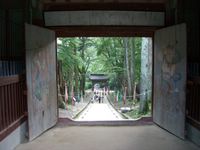
Entrance to Haeinsa.

Outside Haeinsa.
Although the main temple hall is only about 35 years old, there is a national treasure here that is amazing to comprehend. In fact, 80,000 national treasures. The Tripitaka Koreana. Carved wooden blocks that contain the complete Buddhist scriptures and some illustrations. That's a lot of chiseling!
The next day, we climbed to another temple. I didn't find this one as peaceful or beautiful as Haeinsa, but it was kinda cool in its own way. This one was called Tonghwasa. I should probably mention, "sa" at the end of these names means "temple".

Gate to Tonghwasa.
So Tonghwansa is a fairly ordinary temple, but in it's grounds, there are thousands of little stone carved buddhas of all shapes, sizes and facial expressions. Some were cute, some beautiful and some just plain strange.
From here, there was a hike up to the summit of a mountain to see the Grand Stone Buddhist Image for Unification Desire.

Tonghwasa Buddhas.
I'm not really sure what this is suppose to mean, but apparently it's the largest statue of Buddha in Korea. I guess that's kinda neat.
After Daegu, we moved on to Suncheon. I was only planning on staying for a night in Suncheon, but decided to stay a little longer and see two temples that were recommended to me by a number of people.
The first I went to was Sonamsa. I loved this place almost immediately. It was so quiet and peaceful. There were almost no tourists here and the monks were going about their usual business of gardening, fixing stone walls, and of course meditating in that melodious chant with the off beat drumming, that drifted through the compound and relaxed you where ever you were.
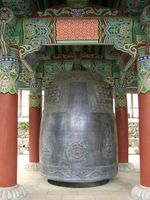
The Bell.

The Fish.

The Cloud
"The large bell calls those who have become decadent. The drum, made of an animal skin, calls the animals; and the cloud-shaped gong calls the beings of the air. The log carved into the shape of a fish calls all that live in water"
Quote from www.buddhapia.com/eng about the meaning of the instruments that are beaten before prayers in Buddhist temples
I was planning on looking around this temple and then doing a nice hike over a mountain to another temple, but after spending so much time here, I was pushing the time limit to catch busses back, so my nice hike (which I've since read in my lonely planet that it's suppose to take 6 hours) turned into the marathon race of 6.2kms over a 884 meter peak in just 2 hours. Not bad for an old fella like me. Ironically, when I got to the temple, I found out the busses run till quite late and I needn’t have rushed at all.
Not to worry though. It just meant I could spend more time at Songgwangsa.
Now for a short lesson in Korean Buddhist Religion: Buddhism, as we all know, started with Siddhartha Gautama. A fellow who was born around 563BC into a nice rich noble family. He spent a bit of his early life questioning the comforts that he was given and eventually went off to meditate on life a bit, to see if he could work out what it all meant. Eventually he achieved "enlightenment" and started the Buddhists on their road to Happiness. (Buddha in a nutshell).

Buddhas Inside Haeinsa.
As with all major religions, the people who followed studied it to bits and eventually came to different ideas on what Buddha was really getting at, so it fractured into different schools of thought and thus, different sects.
The main sect of Buddhism practiced in Korea is Mahayana (Greater Vehicle), which seeks the salvation of all beings. (Hinayana [Lesser Vehicle] concentrates on personal enlightenment). This school has also been split a number of times, but the largest school of Buddhism in Korea is Son Buddhism (Known more widely as Zen Buddhism). The largest faction of Son Buddhism is the Chogye sect and its main temple is Songgwangsa. This is the last temple I visited on my trip.
Songgwangsa is quite a bustling little place compared to Sonamsa, but it manages to keep the air of tranquility going with ease. There is a "school of Buddhism" at this temple, where the "layman" can come to learn more about Buddhism and to experience the life of a buddhist monk. You are able to stay at the temple and participate in meditation and classes on scripture. It sounds interesting. I think I might go back there one weekend and stay for a night. Not sure that I'll enjoy being woken up at 3am though.
So that was basically my extended weekend of seeing the sights.
I realize this was a super long blog and if you've actually made it this far, well done!!! Now you can let your brain relax while you look at all the pretty pictures I took on my trip.
:)

